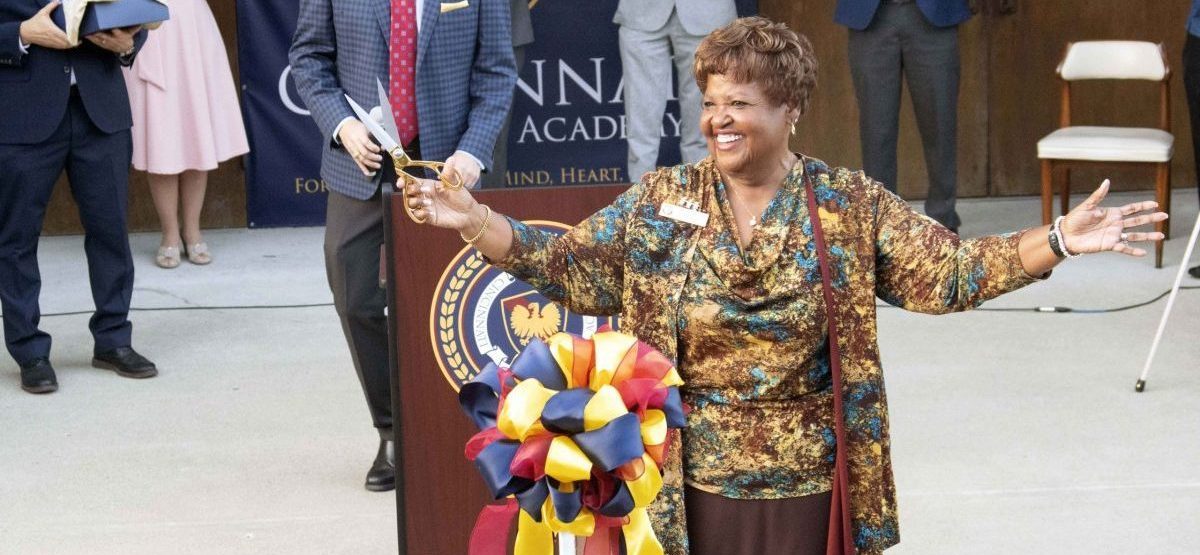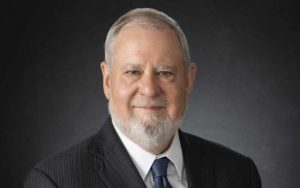News

As charter schools continue to open in the Ohio Valley, a controversial curriculum begins to gain popularity
By: Kaitlin Thorne | Ohio Valley ReSource
Posted on:
CINCINNATI (WOUB) – A small private school in Michigan with ties to former President Donald Trump is shaping how thousands of students are educated in publicly funded charter schools across the country, including right here in the Ohio Valley.
Cincinnati Classical Academy is one of the newest charter schools in Ohio. With 450 students, it is the largest charter to date in the region.
Ohio Board of Education President Charlotte McGuire cut the ribbon during the opening ceremony for the school. She described the opening as a “momentous time.”
“You are here because you value your children,” McGuire said. “You are here because you want an option for every unique child. You are here because you want to build the character and capacity of each unique child in your community.”
It utilizes the Hillsdale 1776 Curriculum, an controversial educational model created by Hillsdale College, a small conservative liberal arts college in Michigan.
Despite the curriculum being criticized by historians as revisionist, it is being taught in a growing number of charter schools across the country, which could impact the finances of local public schools, as well as possibly create a further divide in how students are educated.
What are charter schools?
Charter schools are independently managed, but publicly funded schools. They are not subject to state or local standards of education, giving them more flexibility in what is taught. This has led to a rapid growth of charters across the country in recent years. Between 2009 and 2019, charter school enrollment grew from 1.6 million to 3.4 million.
Charter schools have had a strong presence in Ohio since being legalized in the 1990s. There are over 300 currently active in the state, with plans for several more to open over the next few years.
The foundation for charters has just been set elsewhere in the Ohio Valley.
West Virginia’s first charter schools just opened for the 2022-23 school year following a law to allow them passing in 2019.
Kentucky passed similar legislation in 2017, but a charter school has yet to open because the legislation did not provide a way to fund them. That was remedied this year by HB 9 which provided a funding model. The state’s first charter schools are expected to open next year.
Southeast Ohio Classical Academy is a new charter school set to open in Athens, Ohio in 2024.
The academy has already drawn criticism mainly due to the close association with Brookfield Church, a local non-denominational Christian church that many of the Southeast Ohio Classical Academy board members attend. The academy states on its website, however, that it has zero religious associations.
“We leave questions fo (sic) faith up to the students and their parents. We are not affiliated with nor do we promote a particular religion, church, etc. This school will instead focus on the form of classical education rooted in the history of the last 2,500 years of western civilization,” the website states.
Jennifer Schorr is the president of the Ohio Charter School Authorizers, she said charter schools legally can’t have religious affiliations because they are state and federally funded.
“[They] can’t have anything that isn’t what a public school would have so there’s very much a separation of that kind of thing. They can’t have that in their curriculum, so there’s really not a possibility for that to happen,” Schorr said.
A common concern for communities when a charter school is announced is if the charter will siphon funding away from the local school district. Schorr calls this one of the “biggest misconceptions” about charter schools.
Though the funding model for charters varies by state, charters in Ohio receive both state and federal funding, drawing the set amount of money per pupil. They do not draw funding from local tax levies, but when a student leaves a school district to attend a charter, the state and federal money does leave with them. Despite the potential for a large financial draw from districts, Schorr doesn’t see it as an issue.
“The money that goes to a charter is the money that’s funded for that student,” Schorr said. “The difference between a district student and a charter student is charter students only receive two-thirds the amount of money that a district student receives. So they’re doing it on a third less money, and that money is tied to local tax dollars.”
Hillsdale College and the 1776 Curriculum
The planned charter school in Athens and Cincinnati Classical Academy are part of a network of schools throughout the country that use Hillsdale’s 1776 Curriculum. The Michigan college behind the curriculum has deep Republican ties. Supreme Court Justice Clarence Thomas called the school a “shining city on a hill” in a 2016 commencement address and multiple Hillsdale graduates held prominent positions in the Trump administration, including the chief of staff for Secretary of Education Betsy DeVos.
Hillsdale College maintains that the 1776 Curriculum is distinct from the 1776 Commission, a project created by former President Donald Trump in 2020 in response to the New York Times’ 1619 Project, which looks at the impacts of slavery on American history and the contributions of Black Americans to the country. But the initiatives are related. The curriculum predates the 1776 Commission. Trump appointed Hillsdale College’s president, Larry P. Arnn, to chair the 18-member commission, which mostly included conservative activists and politicians.

One major criticism was that it lacked citations, showing zero evidence of where what was presented as fact was sourced. The report also completely fails to mention any Native American tribes or people.
Following the 1776 Commission report, Arnn and Hillsdale College created the 1776 Curriculum at Hillsdale College, which launched in 2021. It is a K-12 curriculum that according to its website “determines what students should learn in history and civics based on the answers to a single question: What ideas, words, and deeds have most significantly formed the world into which students were born?”
The curriculum has been criticized by historians, who say that it is a revisionist view of American history. For example, the curriculum takes a sympathetic view of founding fathers who were also slave owners, painting them as secret abolitionists.
It specifically highlights George Washington, saying he freed his slaves at the end of his life, which isn’t completely accurate. His will freed only one person outright, William Lee. The 122 other enslaved people owned by Washington were willed to his wife, Martha Washington, with the intent of them being freed upon her death. Slavery continued at Washington’s home, Mount Vernon until 1860.
The curriculum, which is available for download on Hillsdale’s website, also blames “identify politics” for inequality in the country and claims that the civil rights movement “almost immediately turned to programs that ran counter to the lofty ideals of the Founders.”
William Phillis, the founder of the Ohio Coalition for Equity and Adequacy of School Funding, believes this kind of curriculum could be dangerous.
“Hillsdale is pushing an ideology that doesn’t really tell the whole story,” Phillis said.
He believes that education should be about bringing people together, rather than separating based on curriculum.
“Our system should lead to the common good, what’s good for everybody. And these kinds of arrangements lead to tribalism.”
But many conservative politicians don’t seem to agree. Florida Gov. Ron DeSantis has worked closely with Hillsdale College over the last 12 years and currently there are nine schools in the state utilizing the 1776 curriculum.
Tennessee Gov. Bill Lee hopes to create a similar culture, saying earlier this year that he wants Hillsdale to open 100 charter schools in his state. Hillsdale President Larry Arnn was even invited to a private event with Lee in July. Arnn was recorded at the event bashing teachers, saying that teachers “are trained in the dumbest parts of the dumbest colleges in the country,” and asserting that “anyone” can teach.
That wasn’t the first time Arnn stirred controversy. In 2013 Arnn complained about a time when he claims the state of Michigan sent a group of people to Hillsdale College to “look at the colors of people’s faces and write down what they saw.” Arnn went on to state that they were looking for “dark ones.”
Most recently Arnn suggested in an email to Lee that the topics of racism and sexuality should not be taught in schools, but by the child’s own parents.
Despite Arnn’s controversial statements, many parents seem to be attracted to the 1776 Curriculum. Currently 68 schools across the country utilize the curriculum, including four in Ohio. Three more charter schools have been approved to use the curriculum in Ohio, they are expected to open over the next couple years.
The curriculum is based on classical education, an educational model that focuses on traditional and historic liberal arts and natural sciences. Hillsdale also takes the classical approach and injects a patriotic component, boldly proclaiming on its website that “America is an exceptionally good county.”
The college states that as a classical school it “leads students toward moral and intellectual virtue by means of a rich and robust course of study in the liberal arts and sciences, with instruction in the principles of moral character and civic virtue.”
A focus on character is partially what drove Gittel and Yamil Michelen to send their daughter to Cincinnati Classical Academy.
“It builds a person, it’s not only about academics you want kids that eventually become adults that are efficient in society to work well with others and that respect others and that are leaders and not have a lot of knowledge but they know how to apply it,” Gittel said.
The parents also cited the low use of technology in the classroom as a reason for using the school.
“We like going back to the basics,” Gittel said. “Tried methods that have worked throughout time. We wanted less exposure to screens and laptops. Other schools were offering tablets as soon as they got into kindergarten, and it’s pretty cool, a lot of people like it. But we wanted her to have personal experiences, relationships, reading, going back to books instead of being exposed to so many interactive things at a young age.”
Parents Noah Payne and Brooke Riggs agreed. Their eldest daughter enrolled for kindergarten this year at Cincinnati Classical Academy. They plan to enroll their younger children when they begin school. Along with the low use of technology, Riggs said that it was the focus on virtues that interested them.
“Their values that they really embody as school attracted us the most,” Riggs said. “The different beliefs and different community that they’re building here, I just think that it instantly drew us in, like a moth to a flame.”
Editor’s note: This story has been updated to include the full name of The Hillsdale 1776 Curriculum and to clarify the connection between the 1776 Commission and the curriculum.

